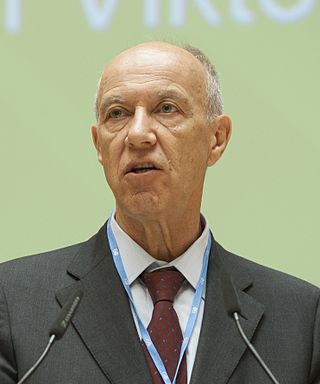
The Convention on Biological Diversity (CBD), known informally as the Biodiversity Convention, is a multilateral treaty. The Convention has three main goals: the conservation of biological diversity ; the sustainable use of its components; and the fair and equitable sharing of benefits arising from genetic resources. Its objective is to develop national strategies for the conservation and sustainable use of biological diversity, and it is often seen as the key document regarding sustainable development.

The World Intellectual Property Organization Copyright Treaty is an international treaty on copyright law adopted by the member states of the World Intellectual Property Organization (WIPO) in 1996. It provides additional protections for copyright to respond to advances in information technology since the formation of previous copyright treaties before it. As of August 2023, the treaty has 115 contracting parties. The WCT and WIPO Performances and Phonograms Treaty, are together termed WIPO "internet treaties".

The World Intellectual Property Organization is one of the 15 specialized agencies of the United Nations (UN). Pursuant to the 1967 Convention Establishing the World Intellectual Property Organization, WIPO was created to promote and protect intellectual property (IP) across the world by cooperating with countries as well as international organizations. It began operations on 26 April 1970 when the convention entered into force. The current Director General is Singaporean Daren Tang, former head of the Intellectual Property Office of Singapore, who began his term on 1 October 2020.
The International Treaty on Plant Genetic Resources for Food and Agriculture, is a comprehensive international agreement in harmony with the Convention on Biological Diversity, which aims at guaranteeing food security through the conservation, exchange and sustainable use of the world's plant genetic resources for food and agriculture (PGRFA), the fair and equitable benefit sharing arising from its use, as well as the recognition of farmers' rights. It was signed in 2001 in Madrid, and entered into force on 29 June 2004.

In the politics of the European Union, an Intergovernmental Conference (IGC) is the formal procedure for negotiating amendments to the EU's founding treaties. Under the treaties, an IGC is called into being by the European Council, and is composed of representatives of the member states, with the Commission, and to a lesser degree the Parliament also participating.
The Paris Convention for the Protection of Industrial Property, signed in Paris, France, on 20 March 1883, was one of the first intellectual property treaties. It established a Union for the protection of industrial property. The convention is still in force in 2024. The substantive provisions of the Convention fall into three main categories: national treatment, priority right and common rules.
Intellectual property rights (IPRs) have been acknowledged and protected in China since 1980. China has acceded to the major international conventions on protection of rights to intellectual property. Domestically, protection of intellectual property law has also been established by government legislation, administrative regulations, and decrees in the areas of trademark, copyright, and patent.
The Rome Convention for the Protection of Performers, Producers of Phonograms and Broadcasting Organisations also known as the International Convention for the Protection of Performers, Producers of Phonograms and Broadcasting Organisations and the Rome Convention, secures protection in performances for performers, in phonograms for producers of phonograms and in broadcasts for broadcasting organizations.

UNIDROIT is an intergovernmental organization whose objective is to harmonize private international law across countries through uniform rules, international conventions, and the production of model laws, sets of principles, guides and guidelines. Established in 1926 as part of the League of Nations, it was reestablished in 1940 following the League's dissolution through a multilateral agreement, the UNIDROIT Statute. As of 2023 UNIDROIT has 65 member states.
Traditional knowledge (TK), indigenous knowledge (IK), folk knowledge, and local knowledge generally refer to knowledge systems embedded in the cultural traditions of regional, indigenous, or local communities.

James Packard Love is the director of Knowledge Ecology International, formerly known as the Consumer Project on Technology, a non-governmental organization with offices in Washington, D.C., and Geneva, that works mainly on matters concerning knowledge management and governance, including intellectual property policy and practice and innovation policy, particularly as they relate to health care and access to knowledge.

Francis Gerard Gurry is an Australian lawyer who served as the fourth director general of the World Intellectual Property Organization (WIPO) from 2008 to 2020. During that time, he was also the secretary-general of the International Union for the Protection of New Varieties of Plants (UPOV). Gurry also served as a deputy director general of WIPO from 2003 to 2008.
The Agency for International Trade Information and Cooperation (AITIC) was a Geneva-based intergovernmental organisation whose mandate was to assist the less-advantaged countries (LACs) to have a more active trade diplomacy by assisting them in better understanding the technicalities of trade rules and World Trade Organization (WTO) agreements. AITIC was founded to contribute to the improvement of their position in the multilateral trading system, to promote good economic governance and trade-led growth which will lead the LACs to benefit from globalisation process.

The African Regional Intellectual Property Organization (ARIPO), formerly African Regional Industrial Property Organization, is an intergovernmental organization for cooperation among African states in patent and other intellectual property matters. ARIPO was established by the Lusaka Agreement of 1976. It has the capacity to hear applications for patents and registered trademarks in its member states who are parties to the Harare (patents), Banjul (marks) and Arusha protocols. ARIPO also features a protocol on the protection of traditional knowledge, the Swakopmund Protocol, signed in 2010 by 9 member states of the organization which entered into force on May 11, 2015, and was amended on December 6, 2016.

Nick Ashton-Hart is the Geneva Representative of the Digital Trade Network (DTN) and represents the ICC United Kingdom on the UK delegation to the meetings of the International Telecommunication Union. He has served in various capacities as the representative of the technology sector to the UN and its member-state delegations in Geneva for more than a decade, including with the Computer & Communications Industry Association (CCIA). Prior to that he was senior director for participation and engagement and director for at-large at the Internet Corporation for Assigned Names and Numbers (ICANN).

The Lisbon Agreement for the Protection of Appellations of Origin and their International Registration, signed on 31 October 1958, ensures that in member countries, appellations of origin receive protection when are protected in their country of origin. It lays down provisions for what qualifies as an appellation of origin, protection measures and establishes an International Register of Appellations of Origin, run by the World Intellectual Property Organization. The agreement came into force in 1966, and was revised at Stockholm (1967) and amended in 1979 and 2015. As of July 2022, 39 states are party to the convention and 1000 appellations of origin has been registered.

The Beijing Treaty on Audiovisual Performances is a multilateral treaty which regulates copyright for audiovisual performances and expands the performers' rights. It was adopted on 26 June 2012 by the Diplomatic Conference on the Protection of Audiovisual Performances of the World Intellectual Property Organization, in which 156 WIPO member states, six intergovernmental, and six non-governmental organizations participated. Forty-eight countries signed the treaty on 26 June, followed by 19 other countries in 2012 and 2013. The treaty entered into force on 28 April 2020 following the receipt of the 30th ratification or accession and as of August 2021 has 42 contracting parties.

WIPO Lex is an online global database launched in 2010, which provides free public access to intellectual property laws, treaties and judicial decisions from around the world. The World Intellectual Property Organization (WIPO) maintains and develops the database.

The United Nations Biodiversity of Areas Beyond National Jurisdiction Treaty, also known as the High Seas Treaty or the BBNJ treaty, is a legally binding instrument for the conservation and sustainable use of marine biological diversity in areas beyond national jurisdiction. There is some controversy over the popularized name of the agreement. It is an agreement under the United Nations Convention on the Law of the Sea (UNCLOS). The text was finalised during an intergovernmental conference at the UN on 4 March 2023 and adopted on 19 June 2023. Both states and regional economic integration organizations can become parties to the treaty.












